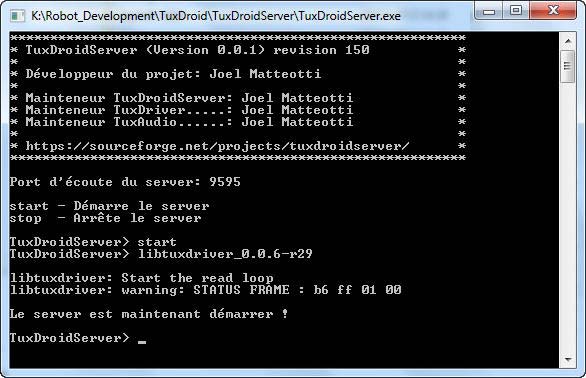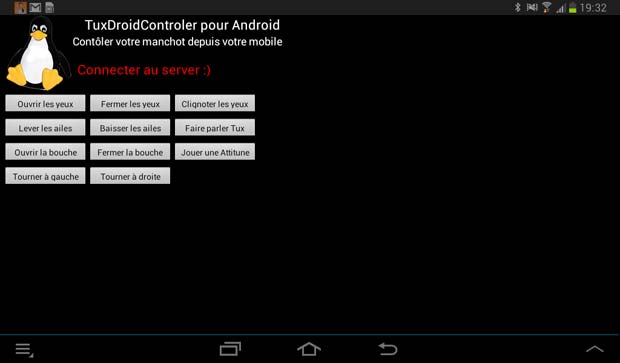Last update : September 1, 2020
Referring to my recent post about the Tux Droid History, I would like to share my findings about the progress of the software development done by the community to keep Tux Droid alive.
Test environment
I use the following equipments to install and test the software :
1. PC Windows 7 64 bits
Windows 7 Edition Familiale Premium
Service Pack 1
Intel Core2 Quad CPU Q8400@2,66 GHz
RAM : 4 GB
Screen resolution : 1.024 x 768 pixels
2. PC Windows 7 32 bits
Windows 7 Edition Familiale Premium
Service Pack 1
Intel Pentium D CPU@2,66 GHz
RAM : 4 GB
Screen resolution : 1.280 x 1.024 pixels
3. Laptop Vista 32 bits
Windows Vista Home Premium
Service Pack 2
Intel Core2 DUO CPU T6400@2GHz
RAM : 4 GB
Screen resolution : 1.280 x 800 pixels
4. Laptop Linux Debian 32 bits
Gnome 3.4.2
Intel Core2 CPU U7500@1GHz
RAM : 1 GB
Screen resolution : 1.366 x 768 pixels
5. Tablet Samsung 2 7.0
Android Version 4.1.1
Dual Core Processor 1GHz
Memory : 16 GB
Screen resolution : 600 x 1.024 pixels (in portrait mode)
6. Tux Droid V2
Firmware : ?
5 ATMEL AVR microcontrollers
RAM : 128 MB
First Tests
Tuxbox 2.0
To start testing, I installed the binaries TuxBox_Setup_French_7_Vista.exe from the Tux Droid community depot on PC 1 and 2 and on Laptop 3. On Laptop 4, I installed the package tuxbox-French-TTS-3.1.4-i386.deb from the same website.
TuxBox 2.0 is running fine on all four equipements.
I uninstalled TuxBox 2.0 on the different computers before continuing the tests to avoid a mixing of libraries and files.
TuxDroidServer
Joël Matteotti developped the TuxDroidServer, using the TCP protocol, to manage the Tux Droid. I installed his Windows binaries TuxDroidServer-rev150-win32-binaries.zip on equipement 1, 2 and 3 and his Linux tarball TuxDroidServer-rev150-linux-i686-binaries.tar.gz on equipment 4. Here are the results of my tests :
- PC 1 (Windows 7 64 bits) : works as expected, but only in compatibility mode XP service pack 3
- PC 2 (Windows 7 32 bits) : works (with crashes) in normal or compatibility mode
- Laptop 3 (Vista 32 bits) : crashes even before the server is started, in normal or compatibility mode (see following figure)

TuxDroidServer crash
- Laptop 4 (Linux Debian 32 bits): Installation fails due to missing file libcurl.so.4. I was not yet able to find and install this shared library.
When the server is started on Windows, libtuxdriver version 29 is indicated. I expect to see version 30, referring to the documentation.

TuxDroidServer started
I don’t find any information about the warning concerning the STATUS FRAME.
TuxDroidClient
The window of the TuxDroidClient has fixed dimensions of 728 x 888 pixels and cannot be resized. I can only use it on PC 2 where the screen hight is sufficient to display the client window.

TuxDroidClient Error Message
The error message displayed by the TuxDroidClient seems to have a problem with the character unicode.
Android Controller
I copied the Android package TuxDroidControler-1.3.0-Android-2.3.3, created by Joël Matteotti, to my Android Development workspace and installed it succesfully with the command
adb install bin/TuxDroidControler.apk
on my equipment 5 (Samsung tablet 2 7.0 ). After saving the IP address, port number and Tux key of the server in the app, it works as expected (knowing that it is still a proof of concept).

TuxDroid Android App
Next steps
In the next step I will try to set up a Tux Droid Development environment for Windows and Linux to compile the binaries from the SVN sources and to progress with my tests based on the most recent software revisions. I will also have a closer look at the firmware and at the driver updates and check if my Tux Droids have the latest firmware. Finally I will file all identified bugs in the Bug Tracker.
